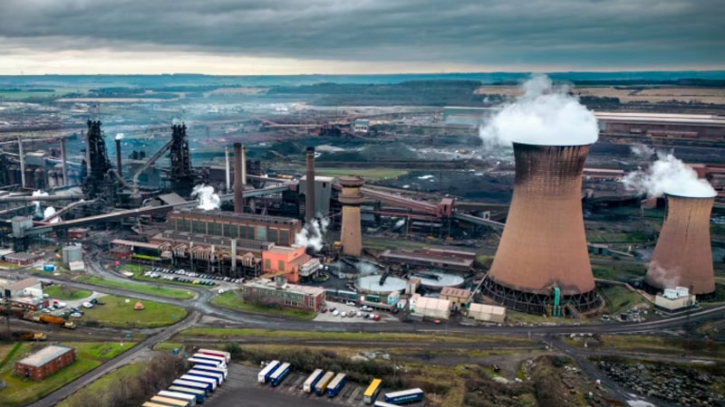British Steel set to cut up to 2,000 jobs

British Steel has confirmed that it plans to close down its blast furnaces in Scunthorpe, putting up to 2,000 jobs at risk.
They will be replaced with two electric arc furnaces - one at Scunthorpe and one at Teesside.
The company said its £1.25bn proposal would make British Steel "a clean, green and sustainable business".
But it said the plans were still "subject to appropriate support" from the British government.
The business, which is owned by China's Jingye Group, said the new furnaces could be in operation by late 2025.
Chief executive Xijun Cao said the firm was not able to keep the blast furnaces and meet environmental commitments.
"We have engaged extensively with the public and private sector to understand the feasibility of producing net zero steel with our current blast furnace operations. However, thorough analysis shows this is not viable," he said.
Unions estimate the shift could ultimately lead to the loss of 1,500 to 2,000 jobs, predominantly at Scunthorpe.
British Steel said it was working with North Lincolnshire Council on "a masterplan" to attract new business and jobs to the site in Scunthorpe, parts of which would become vacant under the proposals.
The Department for Business and Trade said the proposals were part of a plan to put the UK steel industry on a greener, more sustainable footing for the future.
A spokesperson said the government had offered "a generous support package including more than £300m of investment".
Earlier this year, British Steel's larger rival, Tata, announced it would close its two blast furnaces in Port Talbot and replace them with electric arc furnaces, with an expected loss of up to 3,000 jobs. It will receive £500m of government support.
British Steel said it remained in talks with the government over what backing it could expect for its strategy.
"We need the UK to adopt the correct policies and frameworks now to back our decarbonisation drive," said Mr Cao.
The government concedes the plan to close the blast furnaces at Scunthorpe and Port Talbot will leave the UK without the ability to make "virgin steel".
But it says the output from new electric arc furnaces will cover most of the UK's needs.
Blast furnaces use coke in the process of creating "virgin" steel, but the process generates carbon dioxide.
Electric arc furnaces are mostly used to melt down and repurpose scrap steel. The end product is not the same grade of steel that is produced in blast furnaces, and is not suitable for all industrial uses in, for example, motor manufacturing and construction.
However, arc furnaces can be powered by electricity, including renewable generation.
Unions expressed concern at the timescale of the migration and said they would examine British Steel's proposals in detail.
Roy Rickhuss, general secretary of Community, the specialist trade union representing UK steelworkers, said he was "deeply concerned" by the plans, which he described as "dangerous and foolhardy".
"The plans that British Steel has announced, combined with Tata Steel's plans, would leave the UK unable to make steel from raw materials and dangerously exposed to international markets," he said.
Paul Nowak, general secretary of the Trades Union Congress, said workers would not "stand back" as the UK's steel industry was "dismantled in real time."
Unions have already threatened industrial action over Tata's plans.
"The Conservatives are presenting a false choice," Mr Nowak said. "Other countries have shown that it is possible to transition to zero-carbon steelmaking and protect good steelmaking jobs for the future. We can do the same here."
UK Steel, the industry body, said the announcement marked a turning point.
"The UK's major steel producers are taking crucial steps to decarbonise by 2035," said its director general Gareth Stace.
However, critics point out that switching from traditional blast furnaces to electric arc furnaces will not reduce overall carbon emissions, but instead will "export" them, if the UK buys the virgin steel it needs from plants abroad that still use the traditional process.
Production of steel is responsible for around 7% of the world's greenhouse gas emissions, but some countries are pursuing an alternative, low-emission process using hydrogen.
Charlotte Brumpton-Childs from the GMB union said the closure would be "a hammer blow" for UK steel and "devastating" for the people of Scunthorpe.
The towers and chimneys of the steelworks have been part of the Lincolnshire town's landscape for more than five decades, employing generations of local workers.
But the UK's second largest steel manufacturer collapsed in 2019, then was bought by Jingye, with promises to invest more than a £1bn over 10 years.
However, in February the firm announced that it was closing its coking oven. At the time it said steelmaking in the UK was "uncompetitive" with some of the highest energy, carbon and labour costs in the world.
.png)




